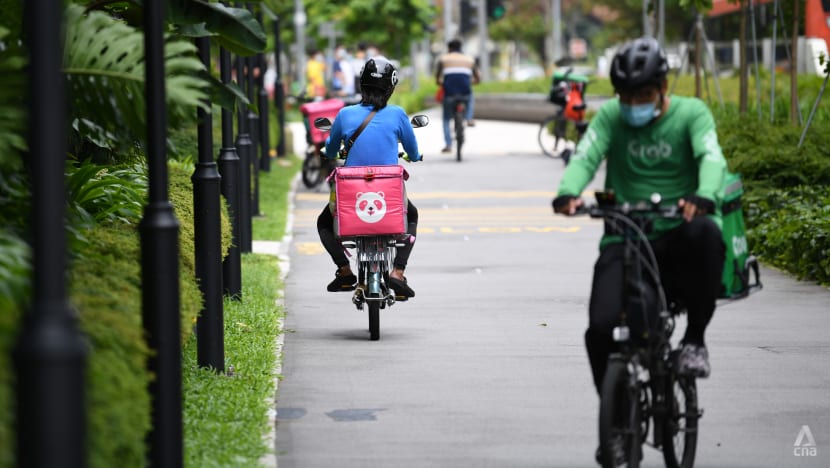Fewer retailer-related offences involving e-bikes last year: LTA
Last year, the figure was 17, fewer than half the 39 in 2023.

Food delivery riders at Paya Lebar Quarter. (File photo: CNA/Calvin Oh)

This audio is generated by an AI tool.
SINGAPORE: The number of retailer-related offences involving power-assisted bicycles (PABs), also known as e-bikes, fell in 2024 compared with the previous two years.
Last year, the figure was 17, fewer than half the 39 reported in 2023, and three times lower than the 55 in 2022.
The offences include unregistered devices kept in shops and improper display of number plates, the Land Transport Authority (LTA) said.
E-bikes, which are powered by electricity, have to be registered with LTA.
Last week, a retailer was fined S$7,000 (US$5,185) for selling an illegally modified e-bike and a non-compliant battery.
Such unlawful devices were linked to two separate blazes in Hougang and Bukit Batok last year and caused one of the users to suffer burns.
WHO USES PABs?
Many food delivery riders rely on PABs, which can be used on roads and shared paths like park connectors.
One retailer, MOBOT, said about 95 per cent of its power-assisted bicycle buyers are delivery workers.
It added that the use of the bikes comes with stringent LTA regulations. The bikes have to adhere to EN15194, an international safety, performance and design requirement standard.
MOBOT general manager Chew Boon Hur said original and approved e-bikes are a safe mode of transportation, but cautioned that some users may modify the vehicles, making them a hazard to others.
"They might want to change to a bigger battery size so they can travel further (without stopping for a charge and) they may want to just buy a charger with a higher ampere so that they can charge the battery faster," he said.
E-bikes in Singapore typically require about 4 to 6 hours of charging time, and how long the charge lasts depends on factors like battery capacity, terrain, riding style, and power level used.
"We do have to remind consumers that any form of modifications to an LTA-approved PAB, basically, will make it non-compliant. And … it will also void the warranty. So the consumer, at the end of the day, will have to bear the entire risk," Mr Chew said.
LTA ENFORCEMENT
LTA said it carries out regular enforcement against errant retailers and users. Consumers are also advised to buy from reputable sources.
The agency also said it is important buyers check for defects when purchasing second-hand devices or parts online. A check by CNA showed that there are hundreds of listings related to PABs in online marketplaces.
While the authorities’ rules and efforts form the foundation for safe e-bike use, riders may decide it is too costly or inconvenient to comply, said transport analyst Walter Theseira.
“Since quite a number of the users are … delivery workers, there's always the possibility of working further with the delivery platforms to educate their partners on what are the risks to themselves as well as to the public from using their PABs in an unauthorised way,” said the associate professor at the Singapore University of Social Sciences’ School of Business.
“At the end of the day, it's also about their safety, it's also about their livelihood. I'm sure they wouldn't want to do something and then have their PABs confiscated, run prosecution risk and then not be able to provide for themselves and their family.”

















